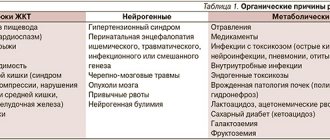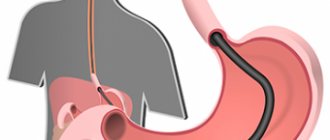For most young parents, it will be a real discovery that their baby farts often, and sometimes does it almost constantly. The baby produces gas during sleep, when awake, during any physical activity, and even when he simply eats. But is it normal that a newborn baby farts often, does he experience discomfort from this, or does getting rid of excess air in the intestines bring him relief? Now we will understand all these issues, and also find out how to deal with excessive gas formation and how to prevent it altogether.
Flatulence in newborns: normal or abnormal?
A healthy person, who does not have any problems with increased gas formation, and whose intestines work as expected, farts on average about 15 times a day. It is worth understanding that in adults the gastrointestinal tract is already fully formed, the functioning of the digestive organs is adjusted and the microflora necessary for its proper functioning is populated.
Gases that are released from the body accumulate in the intestines in different ways - this is air swallowed during eating or talking, and the result of the vital activity of the same microorganisms, and, of course, a consequence of the processes of decay of food debris. It is necessary to take into account that in adults all these processes are well-established, but children are just beginning to get used to them. At first, the baby often farts and poops, but over time this will pass, you just need to give the baby a little time to adapt to his new environment.
Stool of newborns during breastfeeding, its features
It is normal for a newborn to have loose stools.
The color and consistency of an infant's stool are directly dependent on the method of feeding. It happens that parents confuse loose, mushy and frequent stools with diarrhea.
Typically, the stool of a breastfed newborn has the color of yellow, the thickness of sour cream, and the smell of sour milk. However, these indicators are conditional and deviations from the norm can often be found.
They are associated with the peculiarities of the mother’s diet or the introduction of complementary foods. For example, the predominance of dairy products in the menu will give the baby’s stool a yellowish tint. And if the basis of nutrition is plant foods, then expect greenish stools. The presence of cheesy lumps in stool is considered normal.
In the first year of life, a baby may have bowel movements 7-10 times a day. Sometimes he defecates after every meal. In children from one to one and a half years old, this process is repeated 2-5 times a day. After 1.5 years - 1-2 times. The amount of feces is small.
How long should a baby fart?
As a rule, this occurs in newborns much more often than in adults and even older children. A baby farts especially often in the first months of his life. This is due to the diet of children and the characteristics of their body. Parents may notice that their child releases gas most actively after sleep or just before waking up. Moreover, this takes a newborn a lot of time. The baby may fart for 5-10 minutes and this is quite normal. In this way, it gets rid of gases that have accumulated in the intestines.
Newborns cannot yet sit up, roll over, or change the position of their body on their own; they have insufficient physical activity, which causes peristalsis in the body to slow down greatly. Therefore, in principle, it is very good when a month-old baby farts often, this means that he is able to cope with flatulence and his tummy will hurt less. If the gases accumulated in the intestines do not come out, they stretch the intestinal walls, injure it, and cause severe pain.
Intestinal colic
The cause of painful gas formation is often intestinal colic. This is also a normal phenomenon for a baby up to 3-4 months, but it causes him severe discomfort. To prevent them, use the following recommendations:
- Often a newborn baby farts in the evening. He begins to scream, grunt and moan. All this can bother a child during the daytime, but during the day he is busy learning about the world around him, so he doesn’t pay much attention to them. But in the evening, when his nervous system is exhausted, he begins to be capricious. In the evening, provide your baby with a calm home environment to prevent and also quickly cope with the “evening concert”.
- Place the baby on his tummy and play with him in this position. You can use a children's gymnastics ball for the game. Lift the baby's legs and pull them towards you, press them again to the tummy. Thanks to these simple manipulations, feces will be easier to pass and the accumulation of gases will not cause severe discomfort to the baby.
- You can use various colic remedies.
Causes of increased gas formation
When considering the topic of flatulence in infants, it is important to understand when we are talking about the normal physiological process of gas release from the intestines, and when about excess gas formation, which causes serious discomfort to the child, and sometimes painful colic.
If a baby farts often, he has no difficulty with it, he doesn’t cry, eats and sleeps well, and his tummy is soft and not enlarged, then everything is fine. But when the intestines are “seething” and the gas bubbles are so large that it is difficult for the baby to let them out, it means that he needs help. But first you need to find out why your baby farts often. There are several reasons for this:
- he swallows air while sucking on a breast, bottle or pacifier;
- he has insufficient physical activity;
- parents do not carry the baby in a column after eating, and he does not release the air accumulated in the stomach by burping;
- his intestines are not yet fully populated with beneficial microflora;
- the baby’s diet is not suitable;
- the child overeats, and the remains of undigested food rot in the intestines, which causes fermentation and flatulence.
Errors in the mother's diet (if the baby is on breastfeeding) are often cited as one of the factors for increased gas formation in infants. It is believed that breastfeeding women should avoid eating certain foods because they cause flatulence in the baby. These include baked goods, legumes and cabbage, as well as sweets, carbonated drinks and some types of fruits.
Why does a baby fart often: does the mother’s diet affect this?
There is a direct relationship between what a nursing woman eats and what composition her milk actually has. If the mother’s diet includes allergenic foods, “junk” foods, alcohol, overly aromatic additives and foods containing chemicals (flavor enhancers, dyes, flavors, etc.), then the composition of breast milk will not be the best. All “harmful things” get into it to some extent, and accordingly they can cause various reactions in the baby - rashes, diathesis and even diarrhea.
At the same time, pediatricians have reconsidered the role of food in the processes of gas formation in newborns. If a mother eats legumes or cabbage, she will swell, but not the baby. The same point of view is confirmed by the majority of breastfeeding women who did not adhere to a strict diet during breastfeeding. Moreover, they note the fact that if the mother is full, she has fatty and nutritious milk, which the child eats up, he cries less and generally behaves much calmer. Therefore, if the baby farts often, and the gases have an unpleasant odor, or due to their accumulation his tummy hurts, the cause of the problem is probably not in the mother’s diet. Factors influencing flatulence in newborns are listed above.
How to help your baby not swallow air while eating?
Newborn babies do not know how to latch onto the breast correctly. It takes them some time to learn this. The skill of correctly grasping the areola and calm sucking will come about a few weeks after birth. In addition, babies have insufficient oral volume, and with intensive sucking they cannot swallow all the milk that flows from the breast. As a result of this, the baby may often throw the nipple, gasp for air, swallowing it, and it is because of this that he subsequently suffers from colic and often farts. The child needs a month or two to simply grow up and learn to eat properly. But mom herself can help him speed up this process. The first and most important thing is to avoid improper latching of the nipple, when only the tip, without the areola, ends up in the baby’s mouth. In addition, it is very important that during feeding, the baby and mother feel comfortable and are not distracted by noise or uncomfortable positions.
Finally, we will tell you another fact proven by pediatricians and breastfeeding consultants - a nursing woman does not need to express the remaining milk, otherwise it will always arrive in larger quantities than her baby needs. A baby, having swallowed sweet and low-fat top milk, will still be hungry, excess sugar will cause fermentation in his tummy, and provoke pain and flatulence.
Medicines and folk remedies
The most popular folk remedies are herbal infusions. It could be chamomile, dill, fennel, mint. Mothers claim that after consuming herbal infusions, the baby begins to feel good and is not capricious. However, Dr. Kormarovsky claims that it is not plants that have magical properties, but the ordinary water with which they are infused. It is the consumption of large amounts of fluid that helps normalize intestinal function.
Pediatricians recommend purchasing “Espumizan” and “Sab Simplex” from pharmaceutical products. The action of the drugs is aimed at destroying the bubbles in the intestines and removing them naturally. Children do not develop an addiction to the drugs; they are not absorbed into the blood, so they can be taken for a long time.
By
How are overeating and flatulence related in children?
Respected by many parents and fellow doctors, pediatrician Evgeniy Olegovich Komarovsky claims that overfeeding a child has a much worse effect on his health than underfeeding. The baby’s body is not able to cope with the excess food it receives, and therefore if the baby eats more than necessary, this is fraught with the following consequences:
- the remains of undigested food enter the intestines and ferment there, causing gas;
- toxins released when food rots cause allergic reactions, dermatitis and rashes;
- the child's stomach stretches and subsequently he may suffer from obesity.
Moreover, all mothers can feed their child in abundance: both those who established breastfeeding and those who were forced to transfer the baby to IV. You should not give your baby more portions of the formula than are indicated on the food packages. These are average standards and their adjustment is possible only after consultation with a pediatrician. It is enough for the baby to be near his mother’s “sissy” for no more than 20 minutes in order to eat, the rest of the time he only maintains contact with his parent, and does not satisfy the feeling of hunger. Therefore, if a two-month-old baby farts often, perhaps he should be slightly limited in his diet.
Causes of pathological loose stools
Loose stools, which are not normal, indicate that not everything is in order in the baby’s body. The reasons for this pathology can be different:
Nutrition
If a newborn has loose stools a short time after eating, then most likely it is associated with various nutritional disorders. Perhaps the baby food was prepared incorrectly, or the baby ate too much, perhaps breast milk was replaced with regular milk, or the rules of personal hygiene were not observed sufficiently (the dishes were not washed well).
Infections
A very serious reason. If a nutritional problem is easy to eliminate, then treating the infection will be long and troublesome. Depending on its type, which can only be determined by analysis, therapy is prescribed. In this case, it is very important to seek medical help in a timely manner.
Immune deficiency
The main thing is the baby’s well-being and mood
With reduced immunity, the child’s stomach is not able to fully function, so failure may occur in the form of loose stools. In such a situation, after consultation with a specialist, measures are taken to strengthen the immune system.
Congenital defect of the digestive system. Such pathology is diagnosed exclusively by medical specialists. institutions. Diarrhea may also be an accompanying symptom.
Often, loose stools are not an independent disease, but an accompanying symptom that signals another pathology. For example, diarrhea in newborns accompanies:
- urinary tract infections
- colds
- teething period
- throat infection.
Dysbacteriosis
Dysbacteriosis is a violation of the microflora of the stomach. This illness brings many painful moments to both the baby and his parents. However, it goes away pretty quickly.
Constipation in infants
Rare or difficult bowel movements are also the cause of flatulence in children. If the baby cannot poop on time, gases will be released at an increased rate, which especially often happens when the child is one year old. A baby often farts not because he has colic or his intestines are not populated with beneficial microflora. Probably, the body cannot cope with changes in the diet, because it is during this period that babies most actively begin to introduce complementary foods. In order for a child to poop in a timely manner and not suffer from constipation and flatulence, he needs to eat the “right” food:
- vegetables;
- fruits;
- porridge;
- dairy products.
At the same time, you should not get carried away with baked goods and various sweets. One-year-old children are still too small for such food; it causes strong fermentation in the intestines.
Gymnastics for the tummy
To help your baby fart, you need to provide him with moderate physical activity. To do this, it is enough to do a set of gymnastic exercises with your baby every day, which will not only strengthen the growing body, but also improve the state of peristalsis.
These exercises are very simple, they need to be given 15 minutes 3-4 times a day - just when the baby is awake:
- "bike";
- alternately touching the knees to the tummy;
- raising two legs together upward from a supine position;
- cruciform abduction of the baby’s elbows and knees (the left knee needs to be pulled up to the right elbow, then the right knee should be closed with the left elbow);
- placing the baby on his tummy.
Exercises using a gymnastic ball (fitball) have no less beneficial effects on peristalsis. The baby should be placed tummy down and gently rocked on the ball back and forth, as well as to the sides, in a circle. This will not only help him free his intestines from gases, but also strengthen his back and abdominal muscles.
Tummy massage for baby
A very effective way to help a child with flatulence is a gentle tummy massage. To speed up the movement of gases through the intestines, the baby needs to stroke the area around the navel clockwise immediately after sleep or when he cannot fart on his own. But actions must be careful, without pressure, so as not to harm the baby. It’s good if mom does massage right during gymnastics. After a few minutes of stroking, you can pull the baby’s knees towards the tummy to release the gases.
Why does a newborn fart often?
Gases in newborns. Where do they come from?
In the intestines of a newborn, the microflora responsible for the absorption of nutrients has not yet been formed, and there are not enough enzymes that break down food. At first, the baby's intestines do not have time to digest the volume of milk or formula that the baby eats at a time. Residues of food settle on the walls of the digestive tract and begin to ferment. This is how air bubbles appear, which put pressure on the intestines from the inside and cause discomfort to the baby. At the same time, the baby’s tummy inflates and becomes hard. The baby draws in his legs, clenches his fists, starts crying loudly after feeding (especially in the evenings), refuses to eat, and gets nervous.
If your newborn farts frequently but remains calm and feeds well, you're in luck. Gases are eliminated from his body on their own, and by four months they will no longer form in such quantities. If flatulence torments the baby and causes him pain, you need to take the following actions.
We alleviate the baby’s condition correctly
A simple way to relieve discomfort and help your baby digest food more easily is to give him a belly massage before each feeding. To do this, place the baby on his back and begin to move your palm clockwise around his navel, pressing gently. Then proceed to special gymnastics: press the baby’s legs to the stomach and straighten. After each meal, carry the baby in a column for 10-15 minutes until he burps up excess air.
Warm baths with chamomile decoction and compresses from diapers heated with an iron to a pleasant temperature will help your baby relax (they are placed on the baby’s stomach).
Pay close attention to your feeding technique. While eating, babies often swallow air, which increases gas formation. When breastfeeding, the baby should tightly wrap his lips around the entire nipple and part of the areola (nipple circle), while his forehead and chin touch the breast, and his nose breathes freely. If the baby is on IV, choose a bottle with a small hole in the nipple, hold it at an angle of 45 ° C during feeding and do not shake it.
If you are breastfeeding, pay attention to your diet. Eliminate fried and spicy foods, legumes, white cabbage, raw apples, onions, grapes, corn, yeast dough, chocolate, whole milk, strong coffee and tea, and carbonated drinks from the menu. Do not introduce solid foods until your baby is six months old (even if he is on IV).
At the first symptoms of flatulence, start giving your baby natural anti-colic drops “Koli Krokodil”. They contain dill, which reduces gas formation, breaks down air bubbles and helps them exit the body more easily. The remaining ingredients of the drops - anise, mint and lemon balm oils - stimulate digestion, improve intestinal motility, relieve spasms, increase appetite and calm the nervous system. Therefore, “Koli Krokodil” acts faster and more effectively than ordinary dill water. Within ten minutes after taking the drops, the baby will feel relief, stop crying and fall asleep peacefully.
Using a gas outlet tube: pros and cons
Babies sometimes fart often, but only a little at a time, experiencing discomfort from this, because they are never able to release all the gases accumulated in the tummy. To alleviate the child's suffering, he can be given a gas tube. It opens the baby's anus and allows gas to come out, and at the same time provokes defecation.
On the one hand, this simple device saves children from constipation, but on the other hand, you need to understand that this is an extreme measure and you should not get carried away with the gas tube regularly. The child must learn to empty the intestines of both feces and gases. If the mother always helps him with this, then this will interfere with the development of the natural process of adaptation of the child’s body and the problem will drag on for several months, or even years.
Medicines for gas
If, despite performing all the techniques described above, the baby still cannot cope with gases and the mother does not understand why the child farts often, it may be due to intestinal immaturity or dysbiosis. In these cases, flatulence can be overcome with the help of medications.
There is a whole group of drugs based on simethicone (Espumizan, Infacol, Bobotik, etc.). All of them contribute to the splitting of large gas bubbles into small ones, and also facilitate their rapid removal. You can also fight flatulence with the help of herbal medicines. Most of them contain fennel. These can be oil-based drops or teas.
You can also combat excessive gas formation with the help of lacto- and bifidobacteria. Preparations containing beneficial microflora eliminate the imbalance that occurs when the intestines are overpopulated with pathogenic microorganisms. They mostly treat not flatulence itself, but its root cause, and therefore do not have an immediate effect.
A child farts: what to do?
Although frequent gas production is normal, there are times when children need help from their parents. This is necessary when the process is accompanied by tears, loose stools, pain, etc. A nursing mother should reconsider her diet. If the baby is bottle-fed, it is advisable to change the formula. But if increased gas formation appears after changing the mixture, return to the one that was before. You can also find out what to feed your baby if there is no breast milk here.
Carefully monitor your baby's reaction if you give him a new product to try. If your baby farts frequently, turn him onto his stomach after feeding. This is an excellent prevention of flatulence. Massage and special gymnastics, which any mother can perform, will also be excellent helpers. Dill water and children's herbal tea help with increased gas formation.











